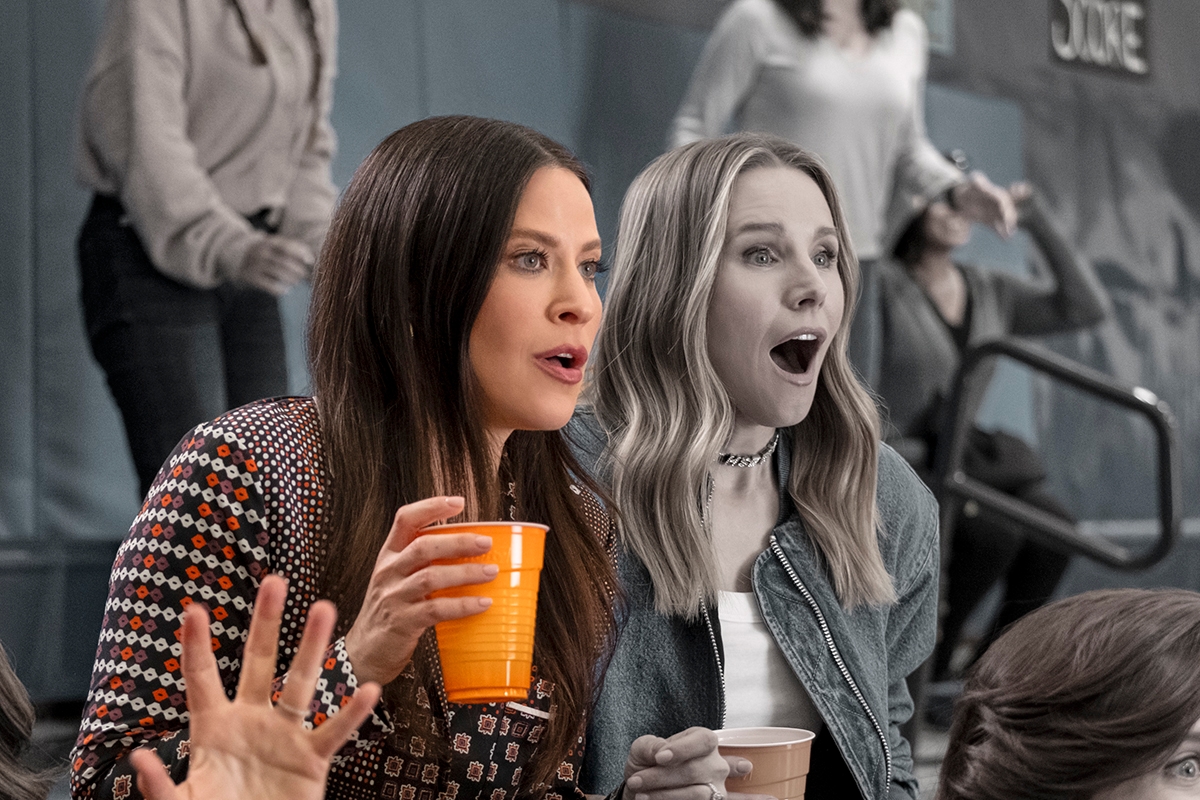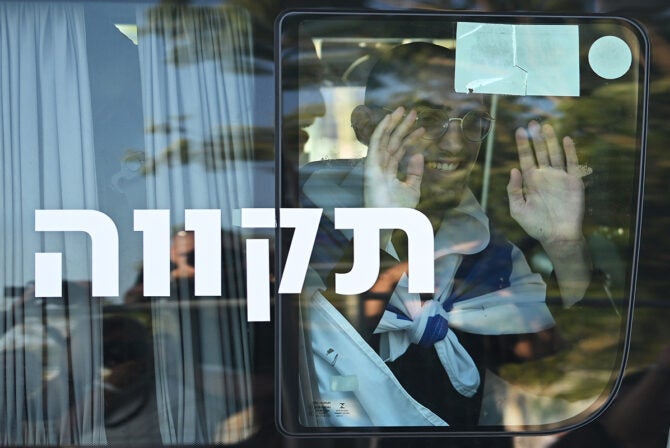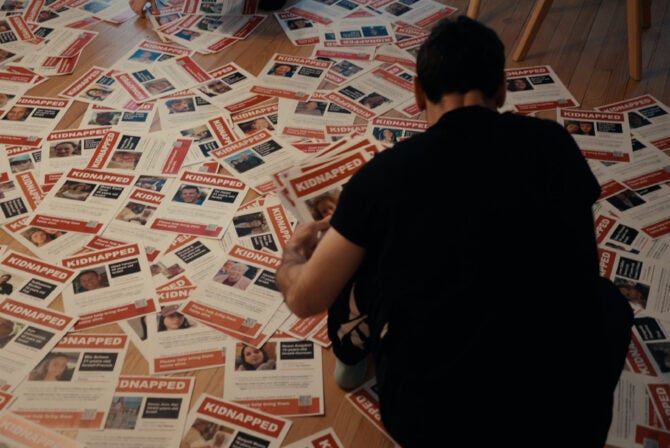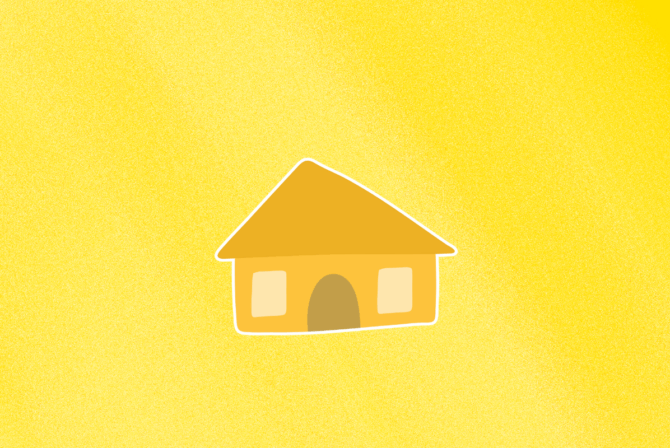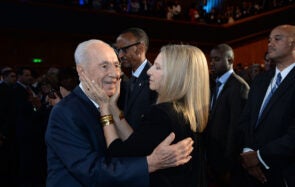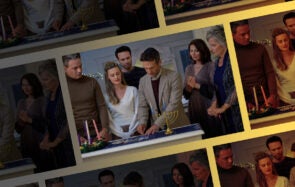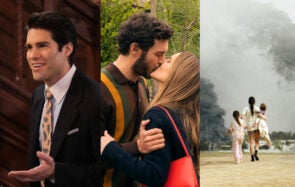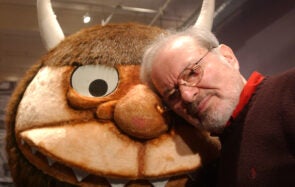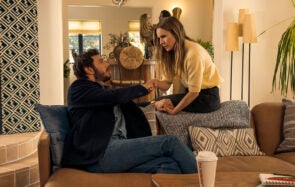I, like many people, have complicated feelings about authentic casting for Jewish roles. Should a Jewish character always be played by a Jewish actor? I’m not sure. Yet there’s something to be said about Jewish certain actors who have a history of playing Jewish characters — even though every role should feel fresh and new. That’s especially true about Netflix’s new “hot rabbi” show, “Nobody Wants This,” in which Adam Brody plays said hot rabbi, Noah Roklov, who falls in love with a non-Jewish woman, Joanne, played by Kristin Bell (who all “Veronica Mars” fans rush to watch in anything). After all, Brody was the first person to introduce America to “Chrismukkah” while playing interfaith teen Seth Cohen in “The O.C.” Of course we want him and his swoon-worthy face in a show about attractive Jewish clergy and intermarriage.
I feel the same way about Jackie Tohn, who plays Noah’s larger-than-life sister-in-law Esther in the show. When I see Tohn on screen, I immediately think of all the roles in the past that have made me love her. I think of young teenaged Tohn as Fran’s sassy cousin in “The Nanny.” I think of her shining briefly and hilariously as Gilda Radner in “A Futile and Stupid Gesture.” I think of her rapping as Joan Rivers. I think of her as Melrose in “GLOW,” especially her role in one of the most poignant Passover seder scenes I’ve seen on TV, a character that Tohn shaped using her own family’s Holocaust history. And so I’m already primed to love her, and especially primed to believe her as a complex Jewish character of any kind.
Tohn’s Esther is, in the end, complex and lovable. Her only line in the trailer of the series is yelling at her husband, and I was a bit worried before I started binging the show that she’d be made into that shrill, overbearing female Jewish stereotype. Esther is certainly loud and outspoken, but she’s also a woman who has a very loving relationship with her husband — yes, she pushes him in his career, but not to places where he doesn’t want to be pushed. She’s a caring mother to Miriam, her young daughter who becomes a bat mitzvah in the final episode. And she’s a really good friend to Rebecca, Noah’s ex. As the series progresses, Esther is shown as both fun and reliable, and in the finale, you see her able to shirk off the weight of tradition and expectations and pull through for her kid. In a very real way, Esther breaks some of the stereotypes about Jewish women and moms — that they’re not desirable, and perhaps more importantly, that they bulldoze and guilt their children into doing what they want. Of all the women in the show, Esther, so aptly named after the heroine of the Purim story, may be my favorite.
Talking to Jackie Tohn was perhaps one of the most delightfully Jewish interviews I’ve ever done. I was so thrilled to chat with her I forgot to ask about her upcoming Jewish summer camp movie, but we did talk about those stereotypes around Jewish women, her own bat mitzvah theme, how her mom is actually Kristen Bell’s thrift store stylist and what it’s like to act opposite Fran Drescher. Also, please, someone give Jackie Tohn and her Jewish parents (Bella and Alan!) their own show, I’m begging you.
I’ve tried to present this interview with Tohn in as much of its full glory, but some of it is edited and condensed for clarity.
Jackie Tohn: So I have to tell you something so funny. *whispers* I’m at therapy.
Jackie!!
That’s on the record, I don’t mind you printing that.
This is already the most Jewish interview I’ve ever done, and we haven’t even started.
The most Jewish interview that’s ever happened. I was in therapy, and it was like, 11:58, and I was like, I have an interview at noon, so I’m gonna run down to my car, and she was like, oh let me let you in one of these other offices…
That’s so safe! You have a great therapist.
The definition of safe space.
I loved you as Esther — she’s such a badass! Tell me a little bit about getting this role in this show.
So initially I got the audition for Rebecca — Adam’s ex. I got that audition through my agents, and because I knew that Kristen [Bell] was playing the shiksa, I shot her a text and was like, “Oh, I’m auditioning for your show,” and she was like, “Oh, wait, there’s a character you’re way more right for! The character is Esther, tell your team that you want to audition for Esther.” And I was like, “Oh, okay.” So it was good to have that intel.
OK, I’m sorry I’m being like an ADHD Jew, but is that your dad’s name on the t-shirt [that reads Alan Tohn, Coverman] that you’re wearing?
Two ADHD Jews, good luck getting anything done today. But are you kidding? You’re speaking my language in more ways than one. Both of my parents were gym teachers, but my dad’s side job was a postal historian. A cover is what an old envelope is called that has a stamp on it, if the stamp is canceled. So a cover are these old envelopes that people would buy and sell and trade, and my dad branded himself “coverman.”
[Speechless, maybe tearing up]
OK, are you OK? Are you going to be OK? Because I understand that you’re probably not OK right now, but more importantly, for the future, do you think you’ll recover from this information?
I feel like I need to interview your dad. You’re not the celebrity here anymore.
No shit. We need to get Paw-Dukes on the horn. So coverman, my dad, made the merch. He had a van that he would drive around to his trade shows: covervan.
[Gasp]
Covervan, Coverman, we all have the shirts. In fact, my roommate, Matt, like he’ll call me and be like, “Yo, my coverman shirt, I’ve worn it too much… there’s a hole in it, do you have another one?” And my dad will send…. [Jackie laughs] Stop crying.
[Openly weeping of joy at this point] I’ve never had anything so special happen to me. He could make big bucks off of this.
His merch would be beyond. Listen, we can talk about my dad the whole interview, and then hang up. I would be thrilled.
I would be too but my editor might not be.
Yeah someone might get pissed. [Editor’s note: I would have also been OK with this.]
OK, back to business: What connected you to this role? What do you love about Esther?
She’s obviously Jewish, and I think that representation is important, and so I’m honored to play her and be part of this show. But I also just wanted to make sure that there was a vulnerability there, and that she be multi-dimensional. So what drew me to the role was like the obvious Jewishness, and how she’s a loud, opinionated woman. I am all those things, and I was excited that the character really spoke to me. But then, once I had the role, what was important to me was making her multi-dimensional, right? Making sure she and her husband love each other. They have a great relationship. She’s mouthy and she’s loud and she’s sort of a blunt force of honesty but she’s fiercely loyal, and we find out in the show why she is the way she is to Joanne, because [Noah’s] ex of six years is her best friend. It’s the conflict that’s there when you now have to be nice to the new person, when you know your best friend is at home crying. And it was quick!
She’s the protective best friend. Everyone wants an Esther on their team.
On the one hand, I could see how people are like, OK, she’s terrifying. But on the other, she loves her kids, she loves her husband, she loves her friends, and also I think she’s in defense of her own lifestyle that is now being compromised, because it was the four of them, right [Noah, Rebecca, Esther and Sasha]? And then that’s gone, and now there’s like…
This new person!
This new person that’s, like, objectively gorgeous and charming and who everyone loves, so that makes Esther’s hackles go up even more.
There are so many Jewish women stereotypes, especially Jewish mom stereotypes. And at first I was like, uh oh, we’re going down that stereotypical path again….
I know!
But then Esther kind of held me back — because she is sexy, and she does have this chemistry with her husband.
Honestly, I’m hoping, if we get a season two, we dive into the nuance even more, because I think that is the challenge, right? You make this show, you want it to be for everyone, and you want everyone to enjoy it. And I was concerned, as a Jewish woman. I don’t want to just be the stereotypical shrill, right? I don’t want to be that. Something I love about the show that’s so relatable is, I have friends from all these walks of life, and in so many cultures, it’s important to them that their child marry someone within the culture.
Now we’re all interfaith and intercultural, and it’s beautiful. My boyfriend’s not Jewish, my brothers aren’t married to Jewish women, and we love all of our family just the same. But there is this feeling from the mothers of a lot of our cultures where it’s like, keep it in the family. So in this instance, we’re Jewish people telling that story. But I think this is a story that a lot of people relate to, where it’s like, oh, my mother-in-law was the same. We wanted to have someone from the same nationality. We wanted to have someone from the same church. We wanted to have someone from the x, y, z, fill in the blank.
And sometimes that thinking does happen in our generation. I didn’t only want to date a Jewish man, but it did make my life easier in many ways, being married to a Jewish person, so I can understand wanting that in a partner, so you can raise your kids Jewish.
Of course, it’s absolutely things like that. It adds so many complications.
I also loved Emily Arlook’s Rebecca in the end. She plays the “mythological ex” so well — she’s so gorgeous.
Per-fect. She’s perfect. I watched the pilot again yesterday, and I was like, God, there is no acting happening here. This is just a person existing in a space. She is so good and believable as that character.
I loved your chemistry with Timothy Simons, who plays Esther’s husband Sasha. He’s so funny.
He’s so funny, and his delivery of things is so funny. He plays this aloof guy who thinks he knows everything so well. It’s such a hard thing he’s doing that he nails… It’s so hard that we don’t even realize it’s hard. Should I say hard again?
Especially when you’re talking about your onscreen husband.
Let’s go baby! You know what’s funny about the me and Tim is we are both… What does it mean, shtarker in [Yiddish]?
Hm… let me look it up. A shtarker means “a person who is well-educated, reliable and trustworthy” or a “tough guy.”
Oh yeah, a shtarker is like a lumberjack, I remember that word. Anyway, Tim and I, we are very alike — we will talk until someone calls cut. And so at the end of our little scenes, they’d just let us go, and we’d add a page of dialogue. We’d just be talking to each other in character. And then it was so fun to watch the show and be like, oh my God, they kept that in. We really had a good time and got on well, he’s the best.
When Morgan, Joanne’s sister, had the sex dream about Sasha, I was like, “No!! We must protect Sasha!” I was so scared.
Must protect Sasha, I completely agree. People keep asking me, what do you think’s gonna happen? I’m like, babe, I don’t know about a season two. One of my best friends texted me — I didn’t know she was watching, didn’t know what was going on — and I just get a text from her that says “he better not fucking cheat on you.” And I was like, “Was this for me?” And she was like, “I’m watching your show.” And I was like, “OK, well, that needs context.” I was like, is she seeing my boyfriend out in the wild, out for coffee with someone?
That is a very disturbing thing to text! What was it like working with Tovah Feldshuh?
Tovah was the best. First of all, I have to post a BTS, because the woman does push-ups before every take, babe. I’m not joking you. So there’ll be a chair. Stop crying. There’ll be a chair. And we’re about to go on, and she’s like, “OK, yes, Timothy,” practicing her Russian accent. She’s practicing her Russian accent and doing push-ups. That is who this woman is. She is a legend, and she must be protected at all costs. And she is a mensch; she is warm, and she is funny, and she was wonderful to work with. Everyone knew who she was, but I was the only one that was like “TOVAH FELDSHUH!!” Tovah signed her book to my mother, to Bella. I sent it to my mom. She was absolutely plotzing.
This is the most important Hollywood connection you’ve ever made!
To my mother, this is the most important connection. She’s like Kristen Schmiston, I buy her fanny packs… I buy her clothes at the thrift store. She always tells the story: My mom will call us from the thrift store and be like, “Are you with KB? I have in my hands an old Mickey Mouse t-shirt. Does she want it?” And then when Kristen wears things, she’s like, “Oh, Jackie’s mom got me this at the thrift.” She’s unreal. My mom called me. She was like, “My phone is ringing off the hook. Everyone at the development is calling. I am fielding calls from everyone.” They live in a 55 and over community. “I am fielding calls from everyone at the development. They are binging it. Everyone is freaking out. You know, I made an announcement at trivia the other night…”
She’s a celebrity now. You make your mom kvell.
Beyond the kvell. All the kvelling. I have a friend named Adam Shapiro, who is an actor. Do you know Shappy’s Pretzels? He’s on “The Bear.” His wife is Katie Lowes from “Scandal.” The reason I brought him up was that when he was little, his temple newsletter had, and I’m so glad I’m telling someone at Kveller this, a “you kvell, we tell,” and he made it to the section when he was in this play. And when I heard it I was like, that might be the best sentence I’ve ever heard. Now you know what my ears respond to. That’s what makes my heart beat in this world.
Who needs an Emmy? Who needs a Tony? All we need is “you kvell, we tell.” When was the first time you heard the word shiksa?
Oh, God, when I was born? Do you know that this show was originally called “Shiksa?”
Yes!
And then they were like, people aren’t going to know what it means. And I’m like, well, I don’t know what “Squid Game” means, who cares? But yeah, I get the wanting to call it something people can understand. Honestly, it’d be impossible to say, because when I was a kid actor, I would have an audition and then want to go to a friend’s birthday party, and my mother would say, “Mit ine tuchas, ken men nit tantzen oyf tzvai chasones,” which means in Yiddish, “With one ass, you can’t dance at two weddings.” My mom spoke Yiddish in my house growing up. My mom spoke Yiddish to her own mother and sister and brother, and my dad picked up a little bit. I picked up a lot of it. So it’s impossible to say when I first heard the word shiksa. I mean, certainly in childhood.
It’s just always been a part of you.
My brothers both married shiksas, and I don’t know that either of my brothers ever dated a Jewish girl. And so it was always like, you know, the shiksa.
But like, in a neutral way?
It was always neutral. It never was presented to me that it even could be derogatory. It was literally just a descriptor.
I feel like I only have heard it in a derogatory way. But I didn’t grow up with Yiddish in the same way.
That’s interesting. I didn’t know that it was charged or even could be incendiary. I was always just like, oh, it means not Jewish. It’s just a word. But I subscribe to, if it’s something that’s offending someone, obviously that’s not a word I’m out here trying to use. I don’t have any hill to die on about how I have to use it. I don’t give a shit — it’s just a word.
We all have such different Jewish experiences. We’re such a small people, but we all live very different lives.
It’s crazy. We’re the smallest minority on the planet Earth.
Yeah, and still so diverse.What was your Jewish experience growing up? How does it compare to what we see in the show, the community in the show?
My Jewish experience growing up was very Reform. I was bat mitzvahed, but I didn’t go to an Orthodox or even a Conservative temple, and then didn’t do much past my bat mitzvah. Probably for my big brother and middle brother, we were doing High Holiday services, at least. But then once I was bat mitzvahed, we kind of stopped all that. And this is more of a hill I would actually choose to die on — and I don’t mean to speak for him, but Adam Brody is the same — we’re like, I’m not a practicing Jew. I know what all the holidays are, but I’m just not a practicing Jew. But I’m so undeniably Jewish: the trauma from which I come, the joking from which I come, the way my people word things, we really are a culture. There’s something about being Jewish. It’s something you can feel.
I interviewed someone on a very different Netflix show, “The Circle.” And she talked about how her non-observant Jewish mom had the most Jewish “neshama,” soul, she’s ever known, and I feel that with you. Like you’ve said more Yiddish words in one interview…
I could go on, and I love “neshama.” My boyfriend was laughing at me this morning because he was reading the Hey Alma thing, 18 things about Jackie. And they quoted me about being Jewish when I said something like, “Oh, I just feel it in my guts.”
Your kishkes!
My kishkes! But either way, that’s sort of what it is. It is the neshama of it. My mother is so Jewish. We just are, but none of us are really going to temple. But we’re Jews.
Do you know what moment got me in the kishkes? That moment with you and Miriam in the bathroom, when you tell her to fuck it and just have the bat mitzvah she wanted. It’s just so beautiful.
That’s that moment too with Esther where she’s like, oh my God, I’ve been up my own ass, mad about who is this Joanne person and having to deal with my mother-in-law and just trying to make everything right. And then it’s like, just exhaling, just let’s have a good time. None of this matters. Go ahead, I love you, and that’s what matters, and, of course, cut your dress and let’s party and have the best day. I feel like that’s all inside of Esther. And I think when she looks at her mother-in-law, it’s very clear what Esther can become and doesn’t want to become. I think there’s still hope for Esther.
In a way, there’s still hope for Bina, too. You never stop growing.
I love that. I totally agree with that.
What was your bat mitzvah theme?
Oh, you know my bat mitzvah theme. I’ll give you one guess!
[scared of guessing wrong] What was it?
Hollywood, baby! But I got pretentious about it. So one table was the directors, one table was the cinematographers, one table was the gaffers. And then the dais where all the friends sat was, of course, the cast. We my huge signing board was like, what are those called, I think slate.
The slate or a clapboard. A clapboard? A clapboard.
Honestly, that sounds horrible, but I think it might be.
It needs to be rebranded.
Clapboard has the same publicist as oak tag. It’s not a good one. My agent at the time was one of the coolest ladies on earth, who is still best friends with my mom. Aggie Gold at Fresh Faces Agency. She and my mom, mostly she, made my centerpieces and stuff.
That’s so special.
Bat mitzvah on a budget, baby.
I just watched you on “The Nanny.” You were INCREDIBLE!
Can you believe it? I’m tiny. I’m like, 12. I don’t even think I was 13. That was my first big gig.
You’re so funny in it.
Thank you. Speaking of kishkes, I have my mom’s kishkes. My mom is so amazing with her timing. She’s so funny, and I grew up listening to her, and so when I got the script, I was like, oh, I’ll just do what she’s doing.
What was it like working with Fran Drescher?
She is my hero to this day. I mean, from when I started my career until now, my goal hasn’t changed, and it’s to be the nanny. Not really the nanny, obviously, but some version of a half-hour multi-cam sitcom. I come down the stairs, live studio audience, that always was my dream. So being on “The Nanny” was so unbelievable. I was a kid, and Fran was so cool. She was so good to me. It was interesting because I did an impression of her for the audition, because they were looking for a mini Fran, so they made me look just like her. But then for the audition, I did, [insert incredible Fran Fine impression here] and I did the whole thing. And when I got there, they were like, don’t do the impression. Do you and be like a little New York.
You’ve played a lot of great Jewish comics. You were Fran. You were Gilda. You were Joan.
All my heroes. That’s making me emotional. Though my mom is my comedy hero, to be honest.
What do you think about Jewish vs. non-Jewish actors playing these roles, and authentic casting in general?
I think it’s case by case. I think if the person is very culturally Jewish, it’s helpful to have a Jewish person play that role, because they understand the culture from which they come. That’s sort of an understood rule for other cultures. But if the person just happens to be Jewish, and it doesn’t matter at all to the character, I personally don’t care if they’re not Jewish.
Like with Joan Rivers, everything she did was Jewish. She wasn’t an observant Jewish person, but everything she did was Jewish.
Yeah, I feel similarly about myself. I just am Jewish. I think there’s a great misconception of, well, anyone can play any religion. In theory, that is true and that does make sense. But given that Judaism is such a culture, I think there’s way more gray area there.
Are you doing anything for the High Holidays? What a Jewish mom question to ask.
I don’t have any plans for it. I think we’ll try and do something. We sometimes do Shabbats at the house, and have other friends who do Shabbat, and it feels comfy and good to just get together, light the candles. We like to throw the challah in my house. A friend of mine taught me about the rip and throw.
That’s our sport.
That’s famously our sport. And shaking the lulav and etrog.
Do you have any favorite scenes or moments from “Nobody Wants This?”
I love the Miriam bathroom scene. And I love the scene where I get in the car with Rebecca, after Joanne has convinced me that she’s cool and fun, and I have to pretend she sucks. Such a friend thing to do. I like the scenes where you see a softer side of Esther. I love the episode with Sasha when he eats a gummy, and I come back and we have our cute little moment on the couch about him being such a good dad, and how I wanted to have sex with him.
It’s such a nice moment of Jewish domesticity. It’s nice to see that representation.
I just wanted to make sure it was all in there. I’m fine with her loud mouth and being mad at people. I love all that, too. But I just wanted to make sure she was a well-rounded person.
